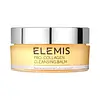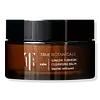What's inside
What's inside
 Key Ingredients
Key Ingredients

 Benefits
Benefits

 Concerns
Concerns

 Ingredients Side-by-side
Ingredients Side-by-side

Prunus Amygdalus Dulcis Oil
Skin ConditioningCaprylic/Capric Triglyceride
MaskingPEG-6 Caprylic/Capric Glycerides
EmulsifyingPEG-8 Beeswax
EmulsifyingCetearyl Alcohol
EmollientSorbitan Stearate
EmulsifyingSambucus Nigra Oil
MaskingPEG-60 Almond Glycerides
EmulsifyingSilica
AbrasiveAvena Sativa Kernel Oil
Skin ConditioningTriticum Vulgare Germ Oil
EmollientButyrospermum Parkii Butter
Skin ConditioningCitrus Aurantium Dulcis Peel Wax
Skin ConditioningGlycerin
HumectantLecithin
EmollientBorago Officinalis Seed Oil
EmollientLavandula Angustifolia Oil
MaskingPhenoxyethanol
PreservativeCocos Nucifera Oil
MaskingLinalool
PerfumingLavandula Hybrida Oil
EmollientPelargonium Graveolens Flower Oil
MaskingEucalyptus Globulus Leaf Oil
PerfumingGeraniol
PerfumingAcacia Decurrens Flower Wax
EmollientRosa Multiflora Flower Wax
Skin ConditioningTocopherol
AntioxidantAnthemis Nobilis Flower Oil
MaskingCocoyl Hydrolyzed Collagen
CleansingLimonene
PerfumingMentha Arvensis Leaf Oil
MaskingSimmondsia Chinensis Seed Oil
EmollientCitrus Aurantium Dulcis Oil
MaskingParfum
MaskingVitis Vinifera Seed Oil
EmollientMenthol
MaskingEugenia Caryophyllus Leaf Oil
MaskingCitral
PerfumingPadina Pavonica Thallus Extract
Skin ConditioningPrunus Amygdalus Dulcis Oil, Caprylic/Capric Triglyceride, PEG-6 Caprylic/Capric Glycerides, PEG-8 Beeswax, Cetearyl Alcohol, Sorbitan Stearate, Sambucus Nigra Oil, PEG-60 Almond Glycerides, Silica, Avena Sativa Kernel Oil, Triticum Vulgare Germ Oil, Butyrospermum Parkii Butter, Citrus Aurantium Dulcis Peel Wax, Glycerin, Lecithin, Borago Officinalis Seed Oil, Lavandula Angustifolia Oil, Phenoxyethanol, Cocos Nucifera Oil, Linalool, Lavandula Hybrida Oil, Pelargonium Graveolens Flower Oil, Eucalyptus Globulus Leaf Oil, Geraniol, Acacia Decurrens Flower Wax, Rosa Multiflora Flower Wax, Tocopherol, Anthemis Nobilis Flower Oil, Cocoyl Hydrolyzed Collagen, Limonene, Mentha Arvensis Leaf Oil, Simmondsia Chinensis Seed Oil, Citrus Aurantium Dulcis Oil, Parfum, Vitis Vinifera Seed Oil, Menthol, Eugenia Caryophyllus Leaf Oil, Citral, Padina Pavonica Thallus Extract
Helianthus Annuus Seed Oil
EmollientHydrogenated Vegetable Oil
EmollientPolyglyceryl-4 Oleate
EmulsifyingPersea Gratissima Oil
Skin ConditioningHydrogenated Jojoba Oil
AbrasiveCetearyl Olivate
Sorbitan Olivate
EmulsifyingCitrus Reticulata Peel Oil
MaskingArgania Spinosa Kernel Oil
EmollientAvena Sativa Kernel Oil
Skin ConditioningCucumis Sativus Oil
EmollientZingiber Officinale Root Oil
MaskingVaccinium Myrtillus Fruit/Leaf Extract
AstringentCurcuma Longa Root Extract
MaskingSaccharum Officinarum Extract
MoisturisingCitrus Aurantium Dulcis Fruit Extract
MaskingCitrus Limon Fruit Extract
MaskingAcer Saccharum Extract
Skin ConditioningYucca Schidigera Leaf/Root/Stem Extract
CleansingTocopherol
AntioxidantCitrus Aurantium Peel Oil
Azelaic Acid
BufferingLactic Acid
BufferingWater
Skin ConditioningLimonene
PerfumingGeraniol
PerfumingLinalool
PerfumingHelianthus Annuus Seed Oil, Hydrogenated Vegetable Oil, Polyglyceryl-4 Oleate, Persea Gratissima Oil, Hydrogenated Jojoba Oil, Cetearyl Olivate, Sorbitan Olivate, Citrus Reticulata Peel Oil, Argania Spinosa Kernel Oil, Avena Sativa Kernel Oil, Cucumis Sativus Oil, Zingiber Officinale Root Oil, Vaccinium Myrtillus Fruit/Leaf Extract, Curcuma Longa Root Extract, Saccharum Officinarum Extract, Citrus Aurantium Dulcis Fruit Extract, Citrus Limon Fruit Extract, Acer Saccharum Extract, Yucca Schidigera Leaf/Root/Stem Extract, Tocopherol, Citrus Aurantium Peel Oil, Azelaic Acid, Lactic Acid, Water, Limonene, Geraniol, Linalool
Alternatives
Ingredients Explained
These ingredients are found in both products.
Ingredients higher up in an ingredient list are typically present in a larger amount.
Avena Sativa Kernel Oil is the oil from colloidal oatmeal.
Besides being a healthy breakfast, oats have many benefits in skincare too.
Colloidal Oatmeal helps sooth, hydrate, and protect the skin. The starches in colloidal oatmeal are able to bind water, keeping the skin hydrated.
Avena Sativa Kernel Oil is also an antioxidant. Antioxidants help stabilize free-radical molecules. These molecules may damage skin cells.
Overall,Avena Sativa Kernel Oil is great at providing the skin with moisture. It also protects the skin as an antioxidant.
Learn more about Avena Sativa Kernel OilGeraniol is used to add fragrance/parfum to a product. It is the main component of citronellol. It is a monoterpenoid and an alcohol.
Monoterpenes are naturally found in many parts of different plants.
Geraniol can be found in many essential oils including Rose Oil and Citronella Oil. The scent of Geraniol is often described as "rose-like". Many foods also contain Geraniol for fruit flavoring.
Geraniol can irritate the skin when exposed to air. However, irritation depends on the ability of geraniol to penetrate into the skin. In general, geraniol is not able to penetrate skin easily.
Geraniol is colorless and has low water-solubility. However, it is soluble in common organic solvents.
Like citronellol, it is a natural insect repellent.
2,6-Octadien-1-ol, 3,7-dimethyl-, (2E)-
Learn more about GeraniolLimonene is a fragrance that adds scent and taste to a formulation.
It's found in the peel oil of citrus fruits and other plants such as lavender and eucalyptus. The scent of limonene is generally described as "sweet citrus".
Limonene acts as an antioxidant, meaning it helps neutralize free radicals.
When exposed to air, oxidized limonene may sensitize the skin. Because of this, limonene is often avoided by people with sensitive skin.
The term 'fragrance' is not regulated in many countries. In many cases, it is up to the brand to define this term. For instance, many brands choose to label themselves as "fragrance-free" because they are not using synthetic fragrances. However, their products may still contain ingredients such as essential oils that are considered a fragrance.
Learn more about LimoneneLinalool is a fragrance and helps add scent to products. It's derived from common plants such as cinnamon, mint, citrus, and lavender.
Like Limonene, this ingredient oxidizes when exposed to air. Oxidized linalool can cause allergies and skin sensitivity.
This ingredient has a scent that is floral, spicy tropical, and citrus-like.
Learn more about LinaloolTocopherol (also known as Vitamin E) is a common antioxidant used to help protect the skin from free-radicals and strengthen the skin barrier. It's also fat soluble - this means our skin is great at absorbing it.
Vitamin E also helps keep your natural skin lipids healthy. Your lipid skin barrier naturally consists of lipids, ceramides, and fatty acids. Vitamin E offers extra protection for your skin’s lipid barrier, keeping your skin healthy and nourished.
Another benefit is a bit of UV protection. Vitamin E helps reduce the damage caused by UVB rays. (It should not replace your sunscreen). Combining it with Vitamin C can decrease sunburned cells and hyperpigmentation after UV exposure.
You might have noticed Vitamin E + C often paired together. This is because it is great at stabilizing Vitamin C. Using the two together helps increase the effectiveness of both ingredients.
There are often claims that Vitamin E can reduce/prevent scarring, but these claims haven't been confirmed by scientific research.
Learn more about Tocopherol